Economy
Sweet Business
Updated: 2011-07-22 14:08
By Lin Jing (China Daily European Weekly)
In January, Starbucks unveiled a new logo that removed the word "coffee" in an effort to provide a bigger stage for products, including tea and confectioneries.
During the unveiling of the company's new logo in Beijing, President of Starbucks Coffee International John Culver explained that the evolution of the brand shows that their products will be more diversified.
"We will develop more drinks and cakes as well as embrace our deep coffee heritage," Culver says.
Starbucks currently has about 450 stores in 35 cities in China. Wang Jinlong, senior vice-president of Starbucks and chairman of its China branch, has disclosed a plan to triple the number of stores on the Chinese mainland, exceeding 1,500 by 2015.
Multinational companies often have an easier time entering China's market than domestic companies.
"Foreign brands have obvious advantages in higher levels of product R&D, food quality, marketing and brand building. They win consumers' recognition shortly after their entrance into the local market," says Zhou, the food industry consultant.
"It helps them to further explore the market and would definitely form a threat toward local companies and make the market increasingly competitive."
White Rabbit creamy candy, a leading brand of candy produced by Shanghai-based Guanshengyuan Food Ltd, was once regarded as the nation's top confectioner.
Despite its past glories in the 1990s, the brand has lost much of its share of the market because of growing competition.
In 2009, to cope with rising of foreign producers and revitalize the brand, the company signed an acquisition deal with CITIC Capital, which bought a 45 percent stake in Guanshengyuan from Shanghai Yimin No 1 Foods.
After the acquisition, Guanshengyuan has focused more on global promotion and aims to introduce the domestic brand to the world.
"To be a multinational enterprise, we expect at least more than half of the sales to be generated from overseas," says Wen Mao, Guanshengyuan's chairman, adding that the company is seeking to obtain a stock exchange listing in two to three years.
Zhu Danpeng, a researcher with 21food, a research firm that focuses on the food industry, says that a long-term and tough battle is waiting ahead for both domestic and foreign companies.
"The industry has entered into a stage of capital operation and monopolization. For the foreseeable future, competition will become more intense."

Specials

China-US Governors Forum
The first China-US Governors Forum is held July 15 in the Salt Lake City, the United States.

My China story
Foreign readers are invited to share your China stories.

Rare earths export quota
China kept its export quota at almost the same level as last year.